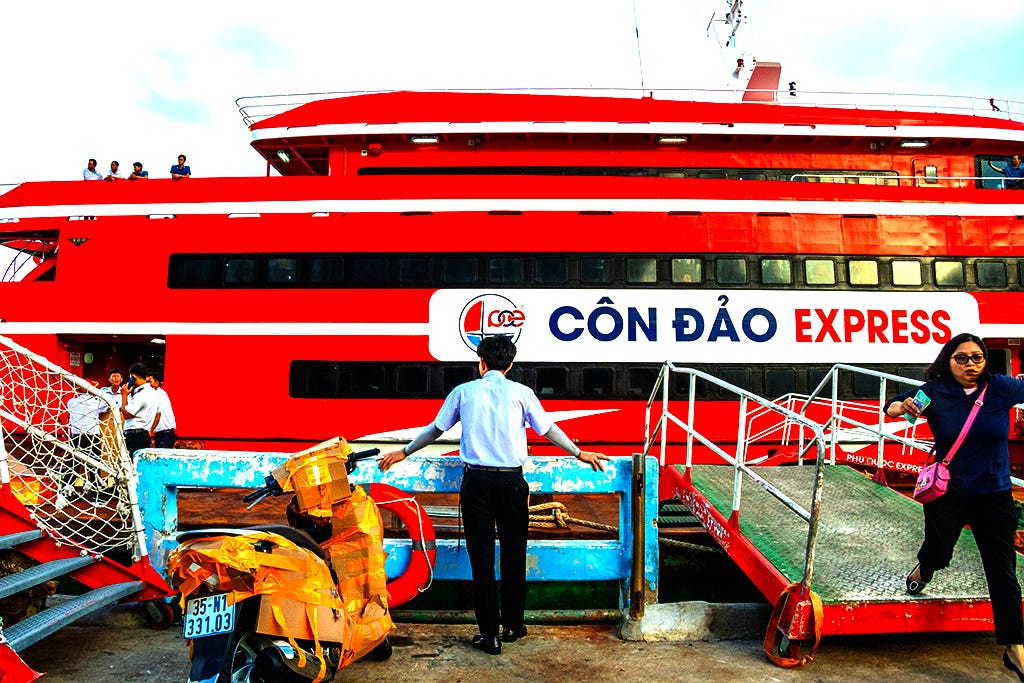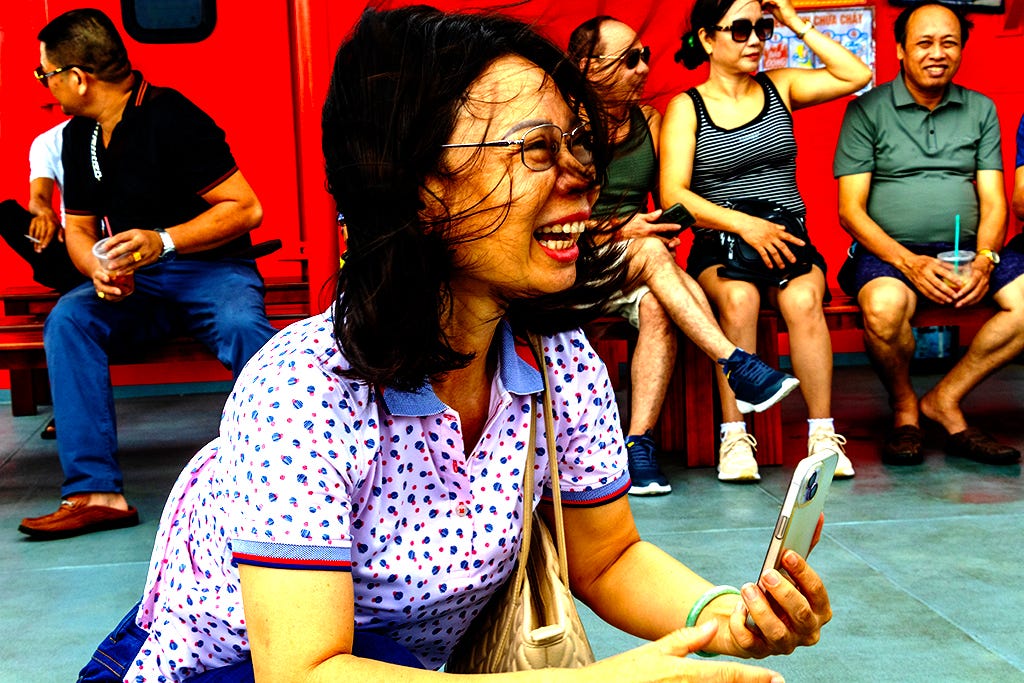[Vung Tau, 7/7/24]
My last night in Vung Tau, I sat at Cóc Cóc Coffee without typing. The day before I had taken my first ocean swim since returning from Australia. Staying in the water too long under a fierce afternoon sun knocked me out for a day. In bed, I heard Thụy Khuê’s lectures on the poet Hàn Mặc Tử (1912-1940) and Vietnam born French writer Phạm Duy Khiêm (1908-1974). Both had a fascinating and troubled life.
Nearly drowning in the sea left a teenaged Hàn Mặc Tử with a phobia of water, aversion towards physical activities and propensity for ingesting quack medicines. Before dying at age 28, he wrote as if in hell. In daily life, the poet never shrieked, howled or looked at anyone with crazed eyes, however. Thirteen days before death, he was still in church twice a day. Suffering poets who die young fascinate.
Phạm Duy Khiêm was brilliant yet difficult. When his buddy Léopold Sédar Senghor sent Khiêm a collection of poems, he returned it with corrections and criticisms marked in red. After another school chum, Georges Pompidou, became president, Khiêm refused to meet him formally because it would look like an audience. He didn’t allow his brother, Phạm Duy, to play the mandolin or even lie on the floor. Phạm Duy would become a great songwriter and poet whose fame far exceeds his cranky brother’s. Khiêm is still relevant because of Légendes des Terres Sereines, his literary and philosophical retelling of Vietnamese and Chinese fairy tales. Undiplomatic Khiêm was briefly South Vietnam’s ambassador to France. He committed suicide at age 66.
Crossing the street outside Cóc Cóc was a family with two little girls under six years old. After reaching this side, they turned around to shout in joy while jumping up and down, “Grandpa is so handsome! Mom, you are so beautiful!” How many similar kids are being butchered right now by Jews with American weapons, money and diplomatic support? If you think that’s a sour note, just be glad you don’t have sour bombs plopping on your roof.
Hanoi’s Railway Tuan Café is getting international attention because its owner refused to serve an Israeli family with two babies. In imperfect English, he said to the outraged father, “My shop doesn’t accept people from your country. We just welcome the human, even dog and cat only.” Shooing them away, he added, “Be careful here, the baby here are not safe. The bomb are automatic, they fly on the baby.”
Jew, “I’m making picture. No one comes to this shop. Whoever comes to Vietnam, no one never ever steps foot into this shop […] We’re in 2024, I’m not moving because I’m Jewish. I’m proud that I’m Jewish and nothing is going to stop me.”
Genocidal Jews and their bloodthirsty American backers can be as proud as they want, but the world is getting sick of their Satanism. Last year an American brainwasher in Vietnam, Mark Ashwill, bashed me on CounterPunch, but he must learn to check his arrogance. Ignorant of her language and history, Ashwill doesn’t care that Vietnam was among the first countries to recognize the State of Palestine. Many white sexpats pose as educators or scholars.
Online responses have been the opposite of what the Jew predicted. A sample:
the General, “An Israeli gets to live like a Palestinian for 3 minutes and look how victimized he feels. What’s even funnier he is recording like this is western social media and hes gonna get the dude cancelled you’re in Vietnam nobody cares lol.”
Ali Hashemi, “First place i’m going if i go vietnam.”
DirtyDeep, “Dude recording like people are on his side [laughing to tears emoji].”
Sir Thomas, “We are all that honourable Vietnamse man !!!!! Free Palestine.”
Tony Montana, “I really congratulate this Vietnamese man for standing up for Palestine, and setting an example. Israelis should be ashamed for crimes against humanity they are committing now in Palestine. Free Palestine now. Netanyahu is a war criminal, and he needs to be arrested and sent to jail now.”
The next morning, I boarded a ship for Côn Đảo. Prison islands sometimes have sinister names, such as Viper Island, Shark Island and Devil’s Island. On the other hand, Cockatoo Island, Great Palm Island and Green Island sound inviting. Known as hell on earth, Côn Đảo is said to be so haunted, you can hear screaming ghosts just before midnight. Since Vietnamese were never on time for any appointment until the 21st century, their specters can’t be more punctual. You can expect such hellish howls, then, at 1, 2 or 3AM.
In Vung Tau over a year, I should have visited it much sooner, but the list of what anyone should have done is endless. Snug in your cardboard coffin at last, you can smack your already rotting forehead while lamenting, “I wasted each second of each day! It’s impossible, though, to resist those Netflix and NFL Game Day promotions. Like nearly everybody else, I experienced much of life through TV commercials.”
The Côn Đảo Express had maybe 160 passengers. Only about four were foreigners. Vietnamese tourists come to pay their respect at historic sites, and to ask for protection and favors, particularly from Võ Thị Sáu. Convicted of killing a French officer and 23 Vietnamese collaborators, she was executed on Côn Đảo in 1952 at age 19. In the only two photos of her, she looks about ten.
Onboard, the mood was festive. It’s exhilarating to move so fast across the ocean under so much sky. Mister Sky, Ông Trời, is colloquial Vietnamese for god. Nguyễn Du (1766-1820) wrote that everything is up to Mister Sky, but this line, so meaningful and even bitterly funny in Vietnamese, is impossible to translate, “Trời kia đã bắt làm người có thân.” Though basically, “That sky has forced man to have a body,” he didn’t say “man” but “being a man,” so having a body is a process that can never end well. To say that sky, “trời kia,” is also hilarious, since there’s only one. “Thân” for “body” evokes, to me, at least, “phân” for “manure.” To have a body is to produce shit until you become shit.
As I killed myself trying to translate line 3242 from Truyện Kiều, a 50-ish woman asked me to take her photos, using her cellphone. Learning I was traveling alone, she suggested we explore Côn Đảo together. I immediately shot that down, but tactfully enough, I hope. From Nghệ An, she had just visited Saigon and Vung Tau for the first time. Her teenaged sons and soldier husband don’t care to travel with her.
“It’s easy to visit Laos from Nghệ An. You should go to Laos.”
“I want to see more of Vietnam first.”
“There are many Vietnamese in Pakse, and in Cambodia, too.”
My limp attempt at friendliness couldn’t mask my stiff rejection. If only for a day, we weren’t meant to be.
Côn Đảo on the map is but a dot, but it rose from the ocean as a truncated mountain range, with smaller islands around it. Our ship had to sound horns to make sure fishing boats get out of the way. To my surprise, there was nothing that looked like a hotel on shore. Walking a bit, I saw one, but it seemed abandoned. Hungry and thirsty, I stopped at a ramshackle cafe for two glasses of pineapple juice. Seeing me, a naked girl still being dried after her bath shouted, “Grandpa! Grandpa!”
I was still eight miles from the center of town, I found out from a motorbike mechanic from Cần Thơ. He was working near my plastic table
“Why did you come all the way out here, brother?”
“It’s too miserable back home.”
“And you’re doing OK?”
“We get by.”
“How are your kids?”
“One just finished the 12th grade. He’s studying to go to Korea.”
“You must be careful. Many Vietnamese work there as fishermen. Some are at sea for weeks at a time, so they’re not really in South Korea.”
“My kid isn’t going there to work, but to study.”
“He must be a brilliant student!”
“He is, and so was my other son. He’s working in Cần Thơ.”
This man can only go home for special occasions. Exiled to hell on earth, he’s trapped in one of its most forlorn corners, but at least he’s not shackled, beaten or bombed. Like me, you and Biden, he’s dodged many bullets.
The motorbike man who took me to town is from Hậu Giang. The couple who own my hotel are from Bình Dương and Hải Phòng. From all over, they drift to this most inconvenient spot, just to eat.
For the rest of my day, I walked a few miles before stumbling onto Côn Đảo’s first mass grave, Skull Ground. In 1862, Vietnamese prisoners and Viet soldiers in the French army revolted. Though succeeding, they had no way of getting back to the mainland. Two weeks later, a fresh French contingent arrived to kill, after 13 days, 100 rebels. The 20 they captured were also buried there, alive.
Skull Ground was later used to raise cattle, with their manure handy for torturing prisoners. In the cowshed women would also be locked up. As I was leaving, a young woman arrived on an electric bike to place flowers at the memorial. It was drizzling and she was alone.
In 93 years, the French had 39 head wardens on Con Dao. Nearly all were mere captains. The main building of their residence, finished around 1876, would fetch millions of dollars today. In the middle of a handsome ground, it faces a quay where new wretches were brought.
Just arrived, I’ve seen hardly anything, but there’s always more time in hell, they say. No longer a penal colony, Côn Đảo can easily be mistaken for paradise. Besides its clean beaches, there are fine restaurants and stores. You can scuba dive to marvel at colorful fish, coral reefs or a sunken American ship. This morning, I passed a poster urging me to listen attentively to my body through yoga.
It’s nearly 2PM and I haven’t eaten lunch. Since there’s a fierce downpour, I must linger a bit longer at this cafe. Among their books is a 352-page volume on Hàn Mặc Tử, with a generous selection of his poems. His soul has chewed through his body, he states, so his flesh is ragged and numb. Eliot, of course, said he “should have been a pair of ragged claws.” Since the tortured are nearly always silenced, sensitive poets must shriek in their stead. Their doing so points to a universal condition. Even when it feels like paradise, hell is just around the bend, underfoot or flying above your entire society.
Look, the rain has just stopped! Into heaven, I will march.
[on ship from Vung Tau to Con Dao, 7/7/24]
[on ship from Vung Tau to Con Dao, 7/7/24]
[Con Dao, 7/7/24]
[Con Dao, 7/7/24]








Yes, saw that Israeli family being rejected by the Vietnamese cafe owner on Twitter. (I do wonder what happened to precipitate the owner's reaction before the video started.) "Anti-semitism!" he and his cohorts will cry. Forever the oppressor as well as the victim. Few other groups (none?) have managed to exist for so long with this contradiction so deeply and widely ingrained in unthinking minds.
For some reason I am reminded of President "Jimmy" Carter's "Malaise" speech to the American people in 1979. Carter never actually used the word "malaise" but the tone of his speech was gloomy, one might even say down cast. The president wore a frumpy sweater and it was strongly implied if not fully expressed, that American viewers needed to turn the heat down in their homes and get used to a bit of discomfort. (I don't believe the term "austerity" was in use at that time.)
Americans resented the buck-toothed, oddly accented Georgia peanut farmer telling them how to live their usually profligate lives and quickly threw the little grinning man out of the office of President and put in his place the slickly bombastic former General Electric pitchman Ronald Reagan in Carter's stead. What followed was about 40 years of economic "neoliberalism" (not to be confused with the political liberalism of Franklin Roosevelt and his New Deal) that, according to scholarly estimates, shifted about 50 trillion dollars of American wealth from the middle and lower classes to the top 10% of the population (see e.g. the writings of renowned economists Emmanual Saez and Thomas Picketty).
Unbeknownst to many Americans President Biden has in many ways tried to put himself forth as the new FDR. (Yes it was hard for me to believe, too.) However the small progress he has made on behalf of the working-class in America only emphasizes how ALL of the presidents since Reagan have essentially sold-out the American working class benefiting the rich, the capitalists and the financiers instead.
I don't know what in Mr. Dinh's current essay reminds me of this except the phrase, "My last night in Vung Tau..." I've reached that stage in life where the word "last" always makes me uneasy. And I wonder if my coffin will be a relatively luxurious pine box or, as Mr. Dinh refers to, mere cardboard (in a pauper's grave)?